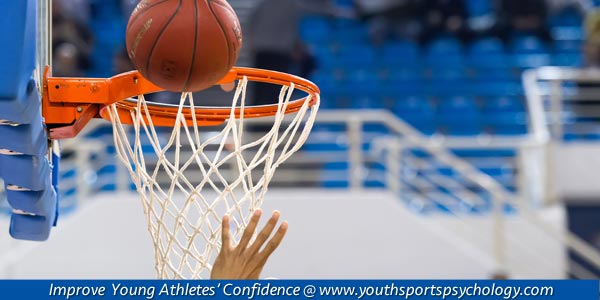
Young Athletes And Self-Doubt
Doubts can creep into your sports kids’ beings without them even knowing what’s happening to them. A player might step onto a basketball court, see a big player swoosh the ball, then start wondering, “Can I really make my shots?”
Once kids open the door to doubt, they’re in trouble. They often start questioning their every move. “Am I too small to play shooting guard?” or “Am I going to goof up like I did three games ago?”
Athletes will startplaying it safe, which means they are tense and worried—rather than relaxed and open to taking risks. This can spiral into a big drop in confidence and poor performance.
In order for kids to play their best, they need to play intuitively and be open to taking risks….
Doubt is even more prevalent for perfectionists.
With high expectations for their performance,they dwell on their mistakes forever.
They keep thinking about their bad putt or their turnovers. What they need to do is move on after a mistake, not criticize themselves or focus too much on what went wrong.
As sports parents and coaches, you can play a big role in your kids’ tendency to doubt themselves.
Ask yourself how you might contribute to your young athletes’ doubts. Do you criticize them or point out their mistakes?
Do you worry out loud before a game, saying thingslike, “I’ve heard the team you’re playing is unbeatable. I’m worried you won’t be able to handle them.”
Or you might unwittingly put a doubt in your kids’minds by saying, “You’re running late. You know you don’t play well if you get to the gym late.”
How you communicate with your young athletes is critically important. Be sure that your words instill confidence and that you don’t unwittingly instill doubts in your athletes.
In addition, watch your body language during games and practices. Kids are very tuned into their parents’ body language–even more so than their words.
If you frown, throw up your hands in disgust, or shake your head, your kids will notice and may start experiencing doubt. And that leads to a break in confidence and poor performance.
Related Articles on Kids’ Mental Game:
- When Young Athletes Struggle With Self-Doubt
- Constructive Criticism Tips for Young Athletes
- Helping Kids Overcome Losses in Sports
*Subscribe to The Sports Psychology Podcast on iTunes
*Subscribe to The Sports Psychology Podcast on Spotify
The Composed Sports Kid

“The Composed Sports Kid” audio and workbook digital download program for young athletes and their parents or coach helps kids cope with frustration and anger in sports. Help your sports kids learn how to manage expectations and let go of mistakes so they can keep their head in the game.
The Composed Sports Kid system is really two programs in one–one program to train parents and coaches how to help their kids practice composure, and one program that teaches young athletes–ages 6 to 13–how to improve composure, let go of mistakes quickly, have more self-acceptance, and thus enjoy sports more!
